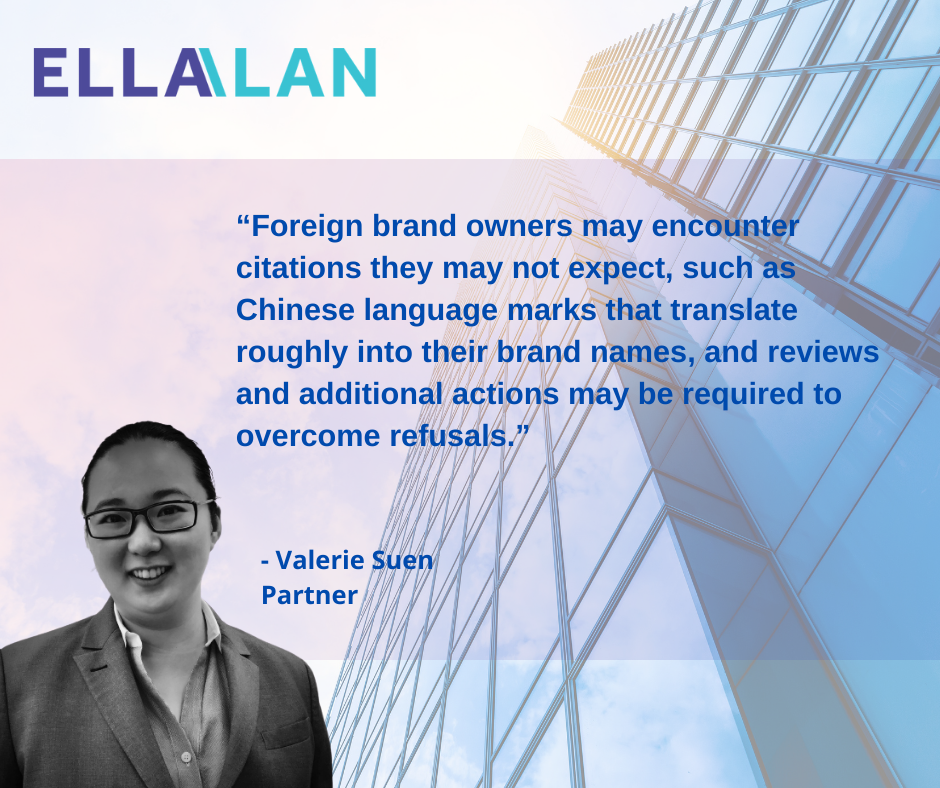Publications
[𝗜𝗻𝘁𝗲𝗿𝗻𝗮𝘁𝗶𝗼𝗻𝗮𝗹 𝗥𝗲𝗴𝗶𝘀𝘁𝗿𝗮𝘁𝗶𝗼𝗻𝘀 𝗦𝗲𝗿𝗶𝗲𝘀 𝟮/𝟲] 𝗜𝗻𝘁𝗲𝗿𝗻𝗮𝘁𝗶𝗼𝗻𝗮𝗹 𝗧𝗿𝗮𝗱𝗲𝗺𝗮𝗿𝗸 𝗥𝗲𝗴𝗶𝘀𝘁𝗿𝗮𝘁𝗶𝗼𝗻𝘀: 𝗖𝗼𝗺𝗺𝗼𝗻 𝗽𝗶𝘁𝗳𝗮𝗹𝗹𝘀 𝗼𝗳 𝗜𝗥 𝗱𝗲𝘀𝗶𝗴𝗻𝗮𝘁𝗶𝗼𝗻𝘀 𝗶𝗻𝘁𝗼 𝗖𝗵𝗶𝗻𝗮
21/02/2022

Following our last International Trademark Registration (“IR”) post on “Taking your brand into China. What happens then?”, we set out in part 2 of our series the common pitfalls of IR designations into China.
************************************************************
An IR is a convenient way for foreign brand owners to extend their brand protection into China. World Intellectual Property Organization (“WIPO”) only examines an IR for formalities and leaves it to the local China National Intellectual Property Administration (CNIPA) to determine whether the IR should be accepted into China and how wide the protection should be under local laws and regulations.
Here are some common issues with IRs which you should consider and pre-emptively seek advice on:
– Most retail- and wholesale-related services in Class 35 which are popular with brand owners are not acceptable in China and will be refused. Items prohibited under local laws, such as gambling-related services, are also not allowed.
– Marks which contravene local laws, even if they are acceptable in overseas jurisdictions, will also be refused. These include gambling-related services and gaming industry brand owners will have to be careful with their list of goods and services.
– Chinese examination standards are different from examination in other jurisdictions. Foreign brand owners may encounter citations they may not expect, such as Chinese language marks that translate roughly into their brand names, and reviews and additional actions may be required to overcome refusals.
– Consent letters are not readily accepted in China. If a brand owner has agreed to a coexistence/consent arrangement with another, it should be tailored with future China-specific IRs and domestic applications in mind.
– China implements a unique subclass system where similar items in a Nice Class are grouped into a subclass. Many IRs do not cover all subclasses in a Class. This can lead to gaps in protection and hijacker marks may be accepted despite having an IR extended into China.
Contact our partner Valerie Suen Suen or counsel Vivian Or Or for more information!
************************************************************
An IR is a convenient way for foreign brand owners to extend their brand protection into China. World Intellectual Property Organization (“WIPO”) only examines an IR for formalities and leaves it to the local China National Intellectual Property Administration (CNIPA) to determine whether the IR should be accepted into China and how wide the protection should be under local laws and regulations.
Here are some common issues with IRs which you should consider and pre-emptively seek advice on:
– Most retail- and wholesale-related services in Class 35 which are popular with brand owners are not acceptable in China and will be refused. Items prohibited under local laws, such as gambling-related services, are also not allowed.
– Marks which contravene local laws, even if they are acceptable in overseas jurisdictions, will also be refused. These include gambling-related services and gaming industry brand owners will have to be careful with their list of goods and services.
– Chinese examination standards are different from examination in other jurisdictions. Foreign brand owners may encounter citations they may not expect, such as Chinese language marks that translate roughly into their brand names, and reviews and additional actions may be required to overcome refusals.
– Consent letters are not readily accepted in China. If a brand owner has agreed to a coexistence/consent arrangement with another, it should be tailored with future China-specific IRs and domestic applications in mind.
– China implements a unique subclass system where similar items in a Nice Class are grouped into a subclass. Many IRs do not cover all subclasses in a Class. This can lead to gaps in protection and hijacker marks may be accepted despite having an IR extended into China.
Contact our partner Valerie Suen Suen or counsel Vivian Or Or for more information!
AUTHORS
No data was found

